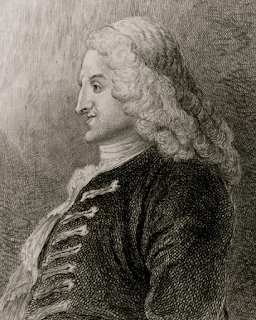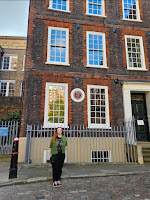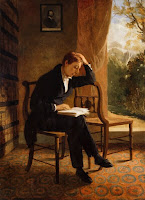Scott, in Praise of Fielding
 |
| Henry Fielding, drawn by his pal William Hogarth |
My first thought upon reading Waverley by Sir Walter Scott was undoubtedly of the similarities between the narration in the beginning of the novel and the infamous narration from select chapters of Henry Fielding's Tom Jones. There are, of course, notable differences in both the style and function of these overly involved narrators, as Fielding's narrator acts almost as a character himself, frequently inserting himself into the novel and taking on an active role commenting on the story; whereas Scott's narrator is less involved and seems to serve more as an author's note, explaining choices made in the writing of the book. The connection I made between the two, however, grew much more substantiated when, upon further research, I found out that in 1820 Scott had written a biography on Henry Fielding's life.
My curiosity won over, and I purchased a $2 eBook of a collection of Henry Fielding related literature in order to read it (I accidentally bought it twice, actually, because I don't know how eBooks work - but, by god, was I not giving up on this). In this short biography, which he titled "The Life of Henry Fielding," Scott notably attributes the conception of the first English novel to Fielding, a somewhat controversial take, claiming Richardson's work was too close to "the old romance" to be considered as such (5682).
He applauds Fielding for his literary genius in this way, taking time to note the many praiseworthy aspects of Tom Jones. The most interesting of this, however, was his doubt "whether [it] can be fully understood, or relished to the highest extent, by such natives of Scotland and Ireland, as are not habitually and intimately acquainted with the characters and manners of Old England" (5662). This is particularly ironic considering Scott himself is Scottish and, as the endnote suggests, wrote this very biography in Abbotsford. Perhaps Scott considered himself an exception to this rule, as he certainly appreciates this novel and its lauded creator enough to write about them almost reverently. This separation between Scotland and England, however, is not just mentioned within the pages of this biography, but is explored throughout the events of Waverley, as well. The English protagonist Edward Waverley is similarly confronted with the divide, spending much of the novel in Scotland during the Jacobite Rebellion.
Now, I only partially understand what the Jacobite Rebellion was, but it must have been important since Fielding wrote all about it in "The Jacobite's Journal" which is probably really interesting to some demographic that does not include me (note that Fielding's life and the historical events of Waverley were happening at the same time). Heavily involved in "the political and literary controversies of the times," Fielding also wrote journals advocating for Whig interests (5678). Waverley similarly addresses these political tensions of the time during which the novel takes place (and the time during which Fielding was writing), with Whig and Tory conflict being introduced early in the novel under the descriptions of Waverley's father and uncle.
While this information may just be a somewhat inconsequential tangent of mine written solely to satisfy my own curiosity, the connections between Fielding's and Scott's work is inarguably fascinating, and it gives further context on the historical events woven throughout Waverley.Scott, Sir Walter. “The Life of Henry Fielding.” Delphi Complete Works of Henry Fielding, 1st ed., Delphi Classics, 2013, pp. 5662–5691.



Comments
Post a Comment